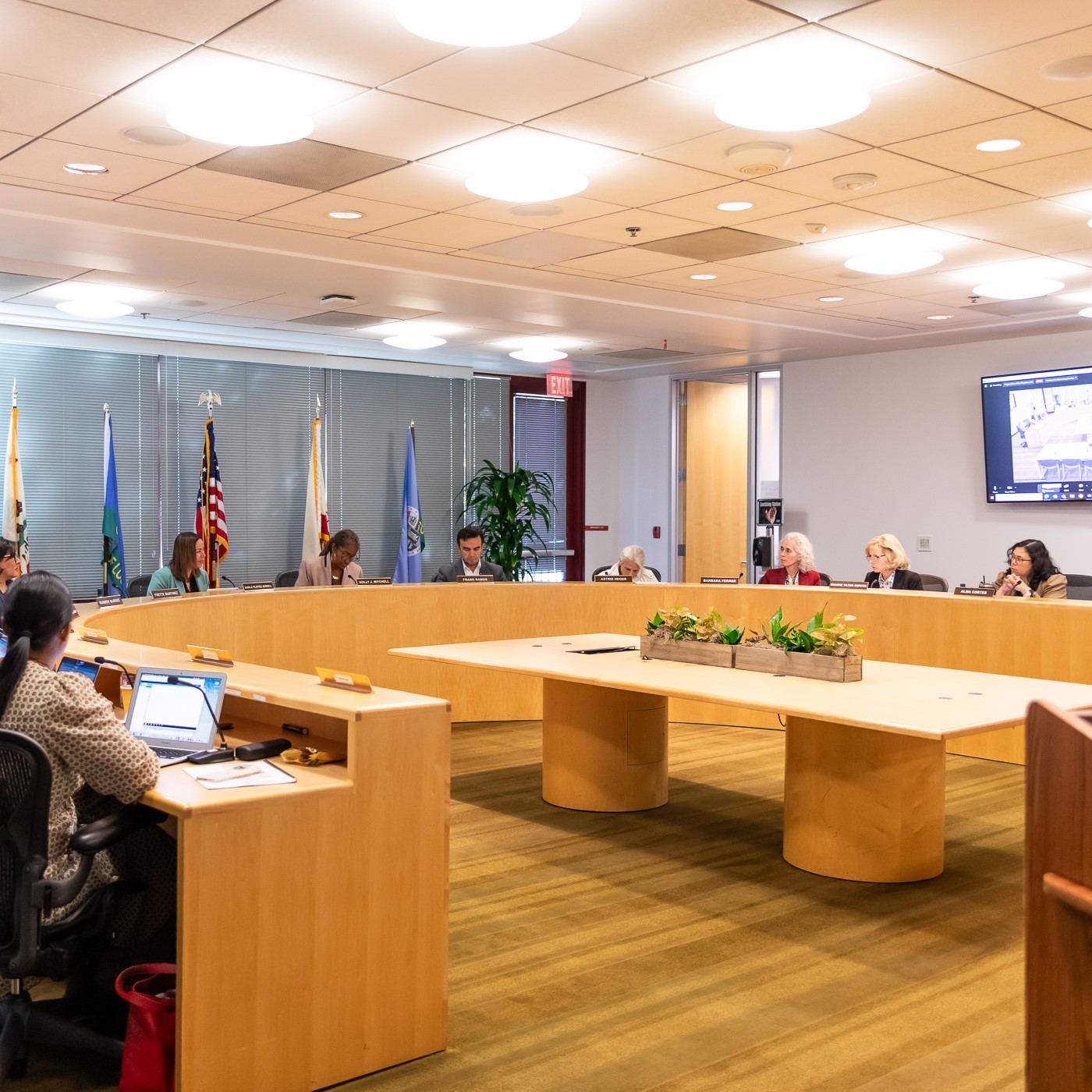May 26, 2020
The COVID-19 pandemic has dramatically and drastically transformed the world as we know it, touching almost all areas of public life including the state’s fiscal outlook and the future planning for child- and family-supporting programs and services in California. Only five months ago, the administration’s January 2020 budget proposal projected a $222.2 billion total budget and a surplus of $6 billion. But Gov. Newsom’s “California For All” 2020-2021 Revised Fiscal Budget presented on May 14 tells a different story of a world that has since been upended by a pandemic. Specifically, with a revised total budget of $203.3 billion and a projected deficit of $54.3 billion. The shortfall means that unless the federal government approves financial support to state and local governments, many of the investments for early childhood supports the governor proposed in the January budget will be reduced or eliminated entirely.
The urgency for federal relief was underscored through the details of the budget itself. California is asking the president and Congress to provide additional funding and relief by passing provisions in the Health and Economic Recovery Omnibus Emergency Solutions Act (better known as the HEROES Act) that would provide an estimated $73 billion in additional support to the state. Such a federal appropriation would offer California a smoother pathway to recovery, eliminate proposed budget cuts and allow lawmakers to fulfill a constitutional mandate to balance the budget by June 15.
Absent immediate Congressional action, the May Revise proposes balancing the budget by implementing a multiyear strategy that draws down the deficit over two years. As a result, the governor’s initial early childhood development planning and governance proposals now face a significant shift and potential reductions.
Planning
Without additional federal funding, the May Revise proposed a $4.4 million reduction in one-time General Funds for the Early Childhood Policy Council (ECPC), which has been tasked to advise in the formation and implementation of the governor’s Master Plan for Early Childhood Development. This cut would leave the ECPC with a total of $2.2 million available for FY 2020-21 and 2021-22.
The Final 2019-20 budget included $20 million to invest in a Child Care Data System to integrate statewide provider and recipient information for the state’s subsidized early learning and care programs. Absent additional federal funds, the May Revise triggers a reduction of $10 million one-time General Fund (GF) from the data system planning and integration efforts.
Governance
Newsom’s January Budget proposed the establishment of a Department of Early Childhood Development within the Health and Human Services Agency to create a unified approach to the provision of early childhood services, including improving access to affordable, quality early learning and care programs for children and families. The May Revision instead proposes $2 million GF to consolidate the state’s child care programs (with the exception of State Preschool) under the Department of Social Services. This is a reduction from the $8.5 million proposed in January for the creation of the new state department.
The revised budget proposes the following shifts in proposed investments aligned with First 5 LA’s Results for Children and Families:
Children have high-quality early care and education experiences before kindergarten

In addition to increases in funding made available to states through the Federal Child Care & Development Block Grant (CCDBG), the governor’s May Revision includes an ongoing $53.3 million to create approximately 5,600 Alternative Payment seats. Additionally, the May Revision appropriates $13.4 million of federal funds through the Health and Human Services Agency (CHHS) to reflect the state’s 2020 Preschool Development Grant award.
However, the proposal makes significant cuts to the California State Preschool Program by planning reductions to the following programs if additional federal funds are not provided:
- Reduces $159.4 million General Fund to eliminate a total of 20,000 Preschool Expansion seats that were scheduled to be released on April 1, 2020 and April 1, 2021.
- Reduces $130 million General Fund for full-day, full school year spaces in the California State Preschool Program (CSPP), which serves income-eligible 3- and 4-year-old children, to align funding with decreased state demand.
- Reduces $94.6 million in Prop. 98 funding and $67.3 million GF to reflect a 10% decrease in the Standard Reimbursement Rate given to CSPP providers that serve income-eligible children and families.
- A reduction of $20.5 million Prop. 98 funding and $11.6 million GF to reflect a suspension of cost-of-living adjustments for providers, who currently make only above the state’s minimum wage, placing additional financial strains on the workforce.
- Also included is an elimination of the proposal for $300 million to expand full-day kindergarten programs. Through one-time grants, funds were aimed at encouraging and supporting school districts’ ability to construct or retrofit existing classrooms to increase full-day kindergarten programs.
Additionally, without federal investment, the May Revision proposes the following cuts to child care:
- Withdraws $363 million one-time General Funds and $45 million one-time Federal CCDBG funds from the 2019 Budget Act that were appropriated to the Early Learning and Care Infrastructure Grant Program and the Workforce Development Grant Program. The Infrastructure Grant Program was established to provide funding to expand the number of early learning facilities within the state and to assist programs with renovating existing facilities to meet health and safety standards. In a similar vein, the Workforce Development Program provides grants to support professional development opportunities and to assist educators in pursuing additional professional learning to improve the quality of care.
- Withdraws from the January proposal $75 million for the Inclusive Early Education Expansion Program, which sought to modify preschool facilities to better serve students with exceptional needs or severe disabilities.
One of First 5 LA’s central asks during Advocacy Day with the California Legislature and a main advocacy alignment with the priorities of the ECE Coalition, was the release of the $350 million in federal funding that the state received through the Coronavirus Aid, Relief, and Economic Security (CARES) Act. The governor’s May proposal included information on the allocation of these funds:
- To meet the needs of child care providers who remained open or intend to reopen during COVID, $125 million has been proposed in one-time stipends for state-subsidized child care providers to address economic hardships due to the pandemic;
- The state will continue to prioritize child care for essential workers by allocating $73 million for emergency child care to expand access to child care for at-risk children and children of essential workers.
- In addition, an effort to provide a 30-day extension of the family fee waiver for child care programs, $8 million has been allocated from the federal CCDBG funds.
- Finally, $144.3 million will be used to backfill costs associated with SB 89, which provides essential resources and support — such as subsidized child care vouchers and family fee waivers — to child care providers and essential working families.
Children receive early developmental supports and services, and are safe from abuse, neglect and other trauma

- The enacted 2019 budget and the governor’s 2020 budget proposal from January both included funding to support the screening of Adverse Childhood Experiences (ACEs).The state also sought funding to train providers on conducting these screens, and to develop a statewide media campaign promoting these efforts.The May Revise reduces, but does not eliminate, the funding for screening and training programs but does eliminate the media campaign.
- The Revise withdraws a proposed Behavioral Health Quality Improvement Program that would have assisted counties in preparing to bolster mental and behavioral health services through the Medi-Cal Healthier California for All Initiative (CalAIM), the governor’s expansive Medi-Cal reform effort that was itself delayed.The Revise also eliminates an expansion of postpartum mental health services within Medi-Cal, proposed in the 2019 state budget to increase access to care for individuals diagnosed with a maternal mental health condition.
- Finally, the Budget Revise is proposing adjustments to Proposition 56 funding that would take $1.2 billion originally intended for supplemental payments for various health care services, and divert this to support significantly higher Medi-Cal caseloads resulting from impacts of the COVID-19 pandemic. Proposed supplemental payments for developmental screening and other family health services will now end absent additional federal assistance.
Families optimize their child’s development
- The May Revise eliminates proposed expansions to the California Home Visiting Program and the Black Infant Health Program, which signify a reduction of $4.5 million in GF ongoing beginning in 2020-21. It also proposes to reduce funding for the CalWORKs Home Visiting program by $30 million GF in 2020-21, absent additional federal funds.
- The Earned Income Tax Credit (EITC) will continue with an expansion of up to a $1,000 credit for eligible families with children under six.
- The May Revise does, however, include the administration’s proposed expansion to Paid Family Leave job protections, including $1 million in assistance to small businesses. This follows on a proposal from the January budget directing the state to provide additional resources to small businesses that extend leave benefits to their employees.
- The May Revise also preserves expanded California Work Opportunity and Responsibility for Kids (CalWORKs) cash grants and includes additional funding to support higher caseloads. The administration predicts CalWORKs enrollment to increase by over 100 percent due to COVID-19, and the program is now expected to serve 724,000 families by next year. To support increased health and social services programs, including CalWORKs and Medi-Cal, the governor proposes to utilize the entire $900 million Safety Net Reserve over the next two years.Lawmakers designed that fund to support increased costs to health and safety net programs, but there was no constitutional requirement that the administration use the reserve for this purpose.
Proposals and reductions to priorities aligned with First 5 LA’s long-term systems outcomes, L.A. County regional priorities and Best Start Community Change agendas

- Maintains $15 million for the California Newcomer Education and Well-Being Project (CalNEW) to assist school districts, including Los Angeles Unified School District (LAUSD), in improving outcomes for refugee and unaccompanied undocumented minor students. First 5 LA opposed the adopted federal public charge rule changes which negatively impacted immigrant families and has supported recent attempts at including immigrant families in any federal COVID-19 relief legislation.
- Withdraws $70 million in Prop 98 funding for school nutrition, but maintains $11.5 million for the Farm to School Program to expand healthy food access in schools. An additional $50 million for the existing Emergency Food Assistance Program for providers and food banks to support increased food purchases as they have been critical in assisting food-insecure families facing job loss due to COVID-19. The funding partially mitigates the loss of CalFresh benefits due to recent federal rule changes, which First 5 LA continues to oppose as the changes would reduce food security for families in L.A. County. An additional $8 million was also maintained for CalFresh’s online application portal and for increased staffing support, including for CalWORKs.
- The January budget had proposed $750 million to establish the California Access to Housing and Services Fund to combat homelessness and promote housing affordability. The May Revise replaces this with $750 million in federal funding to purchase hotels and motels secured through Project Roomkey, to be owned and operated by local governments or non-profit providers. To help prevent the onset of increased homelessness from COVID-19, the Revise includes an additional $331 million to support renters and homeowners with housing counseling, mortgage assistance, and rental legal services, with another $532 million from the CARES Act to support cities in acquiring housing for people experiencing homelessness due to COVID-19, and for increased housing production after the pandemic.
- $8.7 million had been proposed to improve park facilities in disadvantaged communities and expand access to state parks in urban areas. However, the May Revise now reduces the proposal to $6.1 million.
- The May Revise maintains the proposal for a new nicotine content-based E-cigarette tax, which will be $2 for every 40 milligrams of nicotine in the product. Revenues from the new tax, which is slated to begin on January 1, 2021, are expected to be $32 million in 2020-21 and will be deposited into a new special fund to be used for administration, enforcement, youth prevention and healthcare workforce programs. The May Revise proposes $9.9 million and 10.5 positions for the Department of Tax and Fee Administration to administer the proposed tax. In addition, the administration will support a statewide ban of all flavored nicotine products as of January 1, 2021.
State budget development process
The governor’s budget revision is the second step in the state budget development process. From now through June, Newsom and state lawmakers will enter budget negotiations, starting this week with legislative hearings to review proposed revisions and projections. Both chambers will enter a Budget Conference Committee to negotiate any differences between their budget proposals. Once aligned, legislative leadership must submit final budget legislation to Newsom by June 15.The governor must then sign the Budget Act into law by June 30. The state fiscal year, like First 5 LA’s, begins July 1. There have been some signs that the governor and Legislature may also need to revisit the budget in a potential special session after the July 15, 2020 tax deadline if there are changes in income and sales tax revenue receipts.
First 5 LA’s Public Policy and Government Affairs Department will continue to work in partnership with our state advocates in Sacramento (California Strategies), the statewide network of First 5s, grantees and advocacy partners. We will work hard to influence the final budget to best reflect the priorities and the needs of children and families in Los Angeles County with a clear eye to the realities of the COVID-19 response and recovery we face.









